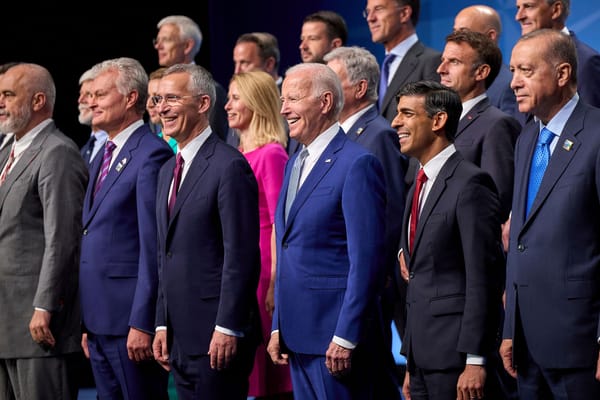The latest NATO summit underway in Vilnius comes at an inauspicious moment for the Western powers. The summer Ukrainian counteroffensive failed to produce much in the way of results, and the shockingly honest admission by President Joe Biden a few days ago that “we’re low” on ammunition was both embarrassing and ominous. For that matter, Washington’s announcement that it would provide cluster munitions to Ukraine hasn’t exactly improved the moral clarity of the conflict.
Against this grim backdrop, Sweden’s accession to the Western Alliance—after Turkey belatedly gave the green light—seems like something of a victory. The optimistic gloss is that the West remains a united front; sure, it might not be quite as strong as we thought, nor as morally superior, but its unity and commonality of purpose must count for something in the end, right?
Perhaps not. In military terms, Sweden is a non-entity. The war in Ukraine has made clear that warfare is now dominated by artillery rather than aircraft; it is production that truly counts when modern industrial nations go to war against each other. In this area, Sweden has nothing to offer. At one time the Scandinavian nation had hundreds of artillery pieces; today, it boasts around 20 howitzers. Ten years ago, Gen. Sverker Göransson, who was at the time the supreme commander of the Swedish Armed Forces, stated that Sweden could defend a single point in the country (such as a city or an airport) for at most a week before other countries would have to intervene and carry on the war on in Sweden’s stead.
So what exactly is the point of Sweden’s accession to NATO? In what way is it a victory? It is becoming clear that the United States can’t support Ukraine all that effectively, and there is no doubt that Sweden can’t support itself. Neither can Germany or Great Britain be expected to lend a hand to Stockholm, because the war in Ukraine has drained these nations of materiel and ammunition, too. Which country is actually supposed to pay the costs in a daisy chain of allied nations in which almost nobody is strong enough for independent self-defense?
“The defense of Europe is becoming an unfunded mandate.”
At this point, the defense of Europe is becoming an unfunded mandate: something everyone agrees is necessary and good but that nobody is actually paying for. The problem isn’t even that Swedish politicians are genuinely convinced that Washington would send in the 101st Airborne at a moment’s notice if Swedish territorial integrity were threatened; it’s that everyone now simply seems to hope that things will somehow magically work themselves out.
Last year, plans were announced across Europe for massive rearmament; in 2023, all of those plans have turned out to be a mirage. The reality of political discontent from high energy prices and spiking inflation, and the looming specter of deindustrialization, have combined to destroy any ability for Europe to make real budgetary commitments to rearmament.
Meanwhile, the one country with real military heft in the alliance—the United States—is increasingly preoccupied with concerns in Asia, and American elites are coming to recognize that American power can’t be everywhere, do everything, and subsidize everyone all at once. But as this happens, there is no commensurate effort for any European country to meaningfully share the load. On the contrary, to Swedish officials, NATO membership means that, if push comes to shove, someone else will pay the costs of war. But that someone else isn’t realistically going to be Spain or Germany, much less Lithuania or Montenegro. Nor does there seem to be a clear conception in Washington of who that someone else might be, other than a creeping realization that it won’t be—can’t be—America.
Back in 2019, French President Emmanuel Macron warned that “what we are currently experiencing is the brain death of NATO.” As the Ukraine war got underway in 2022, this prediction was soundly mocked, as people flocked to proclaim that NATO was back and not going anywhere. Today, Macron’s diagnosis seems more apt than ever. Even as the alliance keeps expanding, nobody can answer the basic question of who will put up the soldiers, the ammo, the blood, and the treasure required to actually fight.
